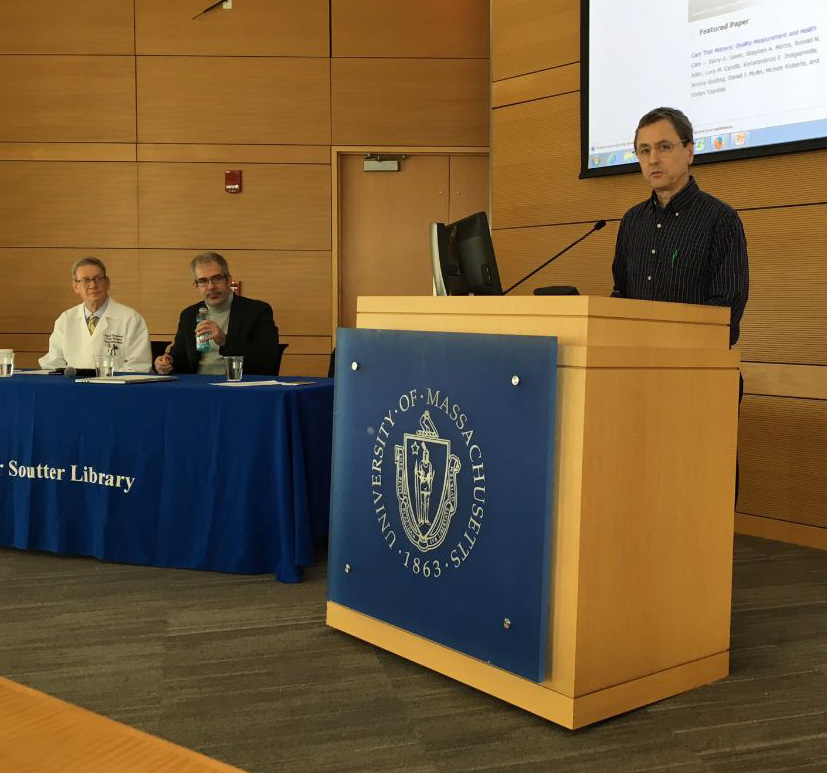
OA Policy Forum Recap
On Wednesday, November 16, Faculty Council and the Lamar Soutter Library hosted an Open Access Policy Forum for the campus. We were joined by panelists Peter Suber, Director of the Harvard Office for Scholarly Communication, and Scott Lapinski, Digital Resources and Services Librarian at the Francis A. Countway Library of Medicine at Harvard Medical School (HMS).
 The Forum began with Peter Suber discussing the merits of a rights-based Open Access Policy. With a rights-based Open Access policy—the kind that we are hoping to implement here at UMMS—faculty grant UMMS the non-exclusive right to redistribute their work non-commercially. There is no action to take for this to occur; rights are conferred through the adoption of the policy.
The Forum began with Peter Suber discussing the merits of a rights-based Open Access Policy. With a rights-based Open Access policy—the kind that we are hoping to implement here at UMMS—faculty grant UMMS the non-exclusive right to redistribute their work non-commercially. There is no action to take for this to occur; rights are conferred through the adoption of the policy.
Faculty will benefit from this kind of policy for a number of reasons: first there is the consistency that comes with an institution-wide policy, relieving individual faculty from having to negotiate to maintain their rights to control or reuse their own work. Second, by depositing their author final manuscript with the library, faculty will automatically increase the dissemination of their work via eScholarship@UMMS and will receive regular usage statics for these works. As a result, faculty will benefit from a citation advantage for these openly available works (an advantage which has long been studied and confirmed. Beyond these immediate benefits to the faculty, there is also the convenience of participating in the development of an institution-wide safety net for any NIH non-compliant papers.
Scott Lapinski then talked about the implementation of this kind of rights-based Open Access policy at HMS, which adopted their Open Access Policy in 2014 by unanimous vote. HMS faculties have integrated the policy into their workflows without disruption and demonstrate, across all Harvard schools, a less than 5% waiver request rate. Citing the early adoption of an Open Access policy at other Harvard schools as well as the safety net for NIH non-compliant papers, Lapinski noted there has been no resistance to the HMS Open Access policy, with his troubleshooting being limited to assisting with manuscript deposition or pointing faculty to their waiver. As Peter Suber noted, Harvard has not had a take-down notice since it has had an Open Access policy in place.
Finally, Dr. Robert Weinstein, Faculty Council Chair, and Rebecca Reznik-Zellen, Head of Research and Scholarly Communication Services at Lamar Soutter Library, closed the panel with a discussion of the state of the pending Open Access policy at UMMS and a demonstration of the UMMS Open Access Policy portal. The portal is dedicated to implementing an Open Access policy on this campus and has an easy-to-use interface to submit papers to eScholarship@UMMS.
The event wrapped up with an open Question and Answer session. Many questions focused on policy implementation, such as:
- if coauthors on a single manuscript are all affiliated with UMMS, who should deposit the paper (the submitting author);
- or, how does the policy impact any agreement I may make with my publisher (the Open Access Policy grants a non-exclusive license to the institution and, as a preexisting license, it survives any subsequent grant);
- or, does this policy apply to journal articles only or to other forms of scholarship as well, such as book chapters (it applies specifically to journal articles, although faculty are welcome to deposit other forms of research to eScholarship@UMMS)?
Other questions more directly addressed the purpose of the initiative: why does UMMS need an Open Access Policy? An Open Access Policy would support the research and educational missions of UMMS by making all scholarly products openly available. Not all research produced at UMMS is funded through the National Institutes of Health, and an Open Access Policy would enable the institution to make those works publicly available. An Open Access Policy would make an explicit institutional statement in support of Open Access through author self-archiving, a legal and no-cost alternative to publishing in author-pays Open Access journals. In addition, having the full-text of all research produced at UMMS would make text- and data-mining projects barrier free.
With engaging and well-informed panelists, the Open Access Policy Forum provided an excellent discussion about the purpose and impact of an Open Access Policy for UMMS. Any departments that are interested in learning more about the pending Open Access Policy should contact Rebecca Reznik-Zellen (Rebecca.reznik-zellen@umassmed.edu).
